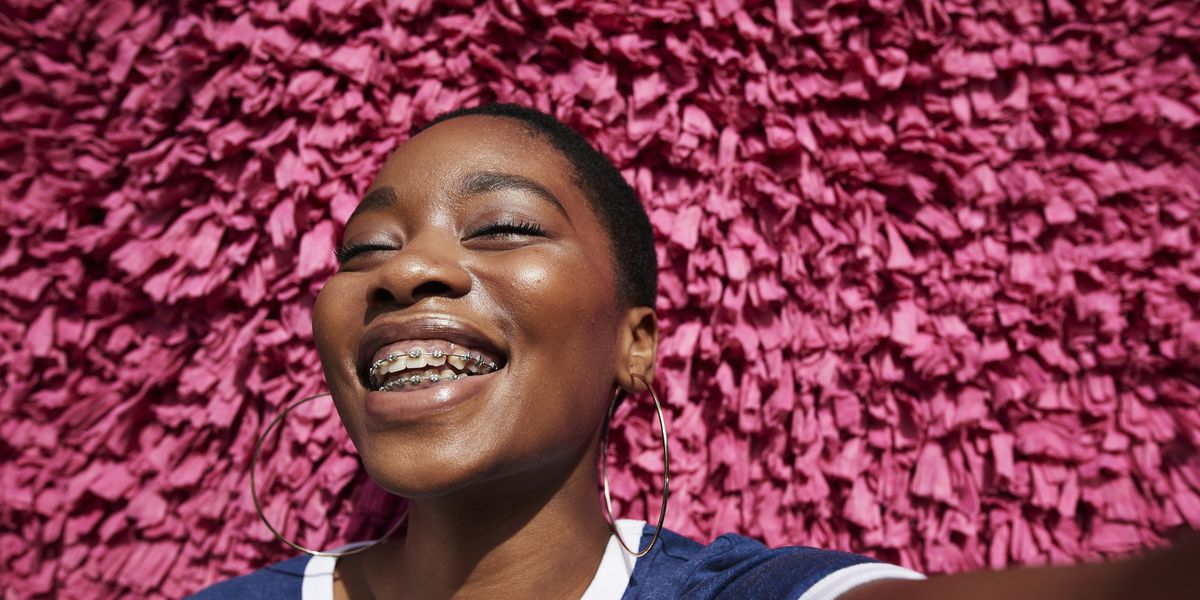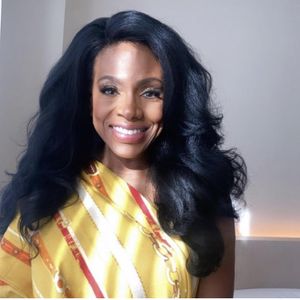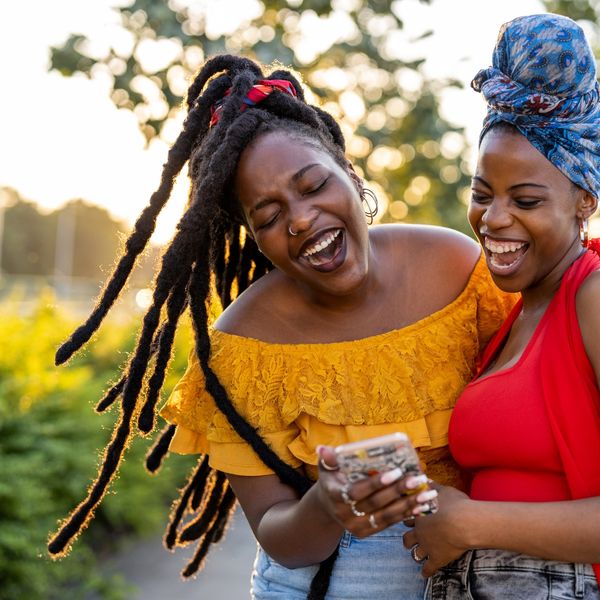
What Does 'Lucky Girl Syndrome' Mean To Black Women?
If you’ve found yourself getting lost in a routine TikTok scroll recently, chances are it wasn’t long before you found yourself on the side of the app where manifestations and delusional mindsets flourish. From mantras to bring forth financial gain to affirmations that promise to have your greatest desires fall into your lap, Gen Z’s latest spin on the Law of Attraction has taken on a new form known as “Lucky Girl Syndrome.”
The term ‘Lucky Girl Syndrome’ was first popularized by creator Laura Galebe, who in a viral video, shared how one simple mindset shift allowed most things to work out effortlessly in her favor. "I just always expect great things to happen to me, and so they do," Galebe explained. As she continued in her video, repeatedly saying, “good things happen to me unexpectedly” for as long as she can remember, was the key to unlocking a life where opportunities were unceasing.
But what exactly is ‘Lucky Girl Syndrome’ and can you truly just think your way into getting everything your heart desires?
According to wellness and life coach Faith Hunter, Lucky Girl Syndrome is essentially the mental, emotional, and spiritual state of ultimate gratitude.
“Lucky Girl Syndrome is all about having a positive mindset, but more than just thinking positive, it’s also feeling it,” Hunter says. “It’s feeling that sensation in your heart and then intentionally moving through your day with that feeling of, ‘I am a blessed person’ and being open to seeing all the different ways the universe can bless you.”
Over the years, the theory behind the Law of Attraction has offered varying interpretations based on which generation is perceiving it. Whether you were raised with the influence of the prosperity gospel or found your way to the popular self-help book, The Secret by Rhonda Byrne, the Law of Attraction/Assumption has a way of evolving from generation to generation.
So when it comes to the Law of Attraction, Lucky Girl Syndrome is to Gen Z as vision boards are to millennials.
“It is definitely the Law of Attraction because it's all about positive thinking,” Hunter explains. “If you're thinking negatively, in most cases, it's going to continue to ripple and happen to you. The same thing goes for thinking positively — the universe will naturally start to deliver opportunities and allow you to see creative ways that things can come into your life.”
Since growing in its popularity, Lucky Girl Syndrome has become as catchy as it is contagious. Women from all sides of TikTok attribute their positive thinking to receiving job offers, brand deals, free food, random heaps of money, and even love. However, when you take a closer look at the faces that make up the trend’s TikTok hashtag with nearly 600 million views, you may notice the faces of Black women missing from the feed.
“When I found out what Lucky Girl Syndrome was, I was very confused, to be honest,” says Diamon Hawkins, a creative futurist and the founder/CEO of Pothos Beauty, who was raised on the notion that if you ask, you shall receive.
“There's this whole delusional mindset right now, so I'm very cautious of how we use literary terms and practices and how the world does that differently now,” she says. When the trend began to surface on her For You page, it initially took the 29-year-old a week to delve into the research behind what it actually meant, only to find that it was a similar mindset to what she grew up with. “I was like, oh, this is just a Law of Assumption and that is how I live my life. That is how I've been raised,” she recalls. “If you believe it and if you can see it, then you can do it. I live my life through that lens.”
Having grown up in the inner city of Bridgeport, Connecticut, Hawkins’ parents instilled in her the practice of not only speaking things into existence but putting the action behind her words. What some could argue is the very thing this latest take on the Law of Attraction via the Lucky Girl Syndrome fails to mention: privilege.
When trends like Lucky Girl Syndrome and “Being Delusional” ignore the systematic and structural inequalities that exist in communities of color and people who don’t come from wealth or means, it can lead to the perpetuation of toxic positivity. What starts off as an innocent trend can easily turn exclusionary when you don’t consider the mental hurdles it takes to overcome one’s daily circumstances. Life doesn’t always deal us a fair card, and to conflate luck with inherited privilege is dismissive. And sometimes, it takes a lot more than simply “thinking” your way out of adversity.
That’s why when it comes down to the trends that we consume via social media, it’s important to have people who look like us sharing their experiences. “I'm really excited to see this trend come to the mainstream. But I would honestly say, I've lived my life in the perspective of manifesting before I even knew the word manifestation.”
For Hawkins, Lucky Girl Syndrome coupled with the support of her communities was vital to helping her get out of a recent depression from balancing the loneliness of being an entrepreneur. “I was in a mental space of lack. Negativity is a parasite to my own mind. And once I started applying Lucky Girl Syndrome or Law of Assumption back into my life things have changed,” she says.
Her revenue streams have increased, career opportunities have come into her life, and she’s seen an overall improvement in her mental and physical health.
“Productivity is a medicine. I had to get back to the mindset of, ‘it will work out for me.’”
When starting on your path to positive thinking through Lucky Girl Syndrome, Faith Hunter says that starting with small doses of gratitude is the best approach. “In order for that mind shift to happen, you have to start small. The easiest and smallest step to take is to wake up every morning and feel a sense of gratitude. Say, ‘I am grateful that I awoke this morning. I am grateful that I have my body. I am grateful for the breath that I am breathing. I am grateful for the roof over my head,” she shares.
“What then begins to happen is that once you start to recognize and acknowledge those simple, basic things, over time you're going to think yourself into greater things.”
While reading the book, The Mastery of Self, Hawkins was drawn to a quote that read, “Negative thoughts are parasites. You need to be an ally to your brain.” This note, in turn, became a reminder that in order to truly embrace a positive inner voice that brings good into your life, you must first be a friend to yourself at every stage of your life.
“If you are someone who is hesitant about the Law of Assumption or Lucky Girl Syndrome, speak to yourself the same way you would speak to your younger self. Meet her in the middle. Pour into her. And tell her, ‘it's going to work out for us.'”
Let’s make things inbox official! Sign up for the xoNecole newsletter for daily love, wellness, career, and exclusive content delivered straight to your inbox.
Feature image by Klaus Vedfelt/Getty Images
Aley Arion is a writer and digital storyteller from the South, currently living in sunny Los Angeles. Her site, yagirlaley.com, serves as a digital diary to document personal essays, cultural commentary, and her insights into the Black Millennial experience. Follow her at @yagirlaley on all platforms!
ItGirl 100 Honors Black Women Who Create Culture & Put On For Their Cities
As they say, create the change you want to see in this world, besties. That’s why xoNecole linked up with Hyundai for the inaugural ItGirl 100 List, a celebration of 100 Genzennial women who aren’t afraid to pull up their own seats to the table. Across regions and industries, these women embody the essence of discovering self-value through purpose, honey! They're fierce, they’re ultra-creative, and we know they make their cities proud.
VIEW THE FULL ITGIRL 100 LIST HERE.
Don’t forget to also check out the ItGirl Directory, featuring 50 Black-woman-owned marketing and branding agencies, photographers and videographers, publicists, and more.
THE ITGIRL MEMO

I. An ItGirl puts on for her city and masters her self-worth through purpose.
II. An ItGirl celebrates all the things that make her unique.
III. An ItGirl empowers others to become the best versions of themselves.
IV. An ItGirl leads by example, inspiring others through her actions and integrity.
V. An ItGirl paves the way for authenticity and diversity in all aspects of life.
VI. An ItGirl uses the power of her voice to advocate for positive change in the world.
Let’s make things inbox official! Sign up for the xoNecole newsletter for daily love, wellness, career, and exclusive content delivered straight to your inbox.
11 Celebrity Couples With Significant Age Differences
There's nothing new under the sun, and that goes double for some of this year's biggest dating trends, which have caused romantic tropes of the days before to have a 2024 resurgence. One of them is the May-December relationships of the past, receiving the modern-day rebrand of age-gap dating. Age-gap relationships have been a common occurrence in Hollywood since the very beginning, and some of our favorite celebrity couples even have some of the biggest age differences.
From 9 years to 40 years, the following celeb couples are proving a prominent age difference doesn't always have to be a deterrent in thriving long-time love:
Let’s make things inbox official! Sign up for the xoNecole newsletter for love, wellness, career, and exclusive content delivered straight to your inbox.
Featured image by Gregg DeGuire/WireImage









